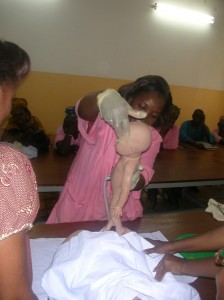Mali Ramps Up Training Auxiliary Midwives in Key Intervention to Combat Maternal Death

By Kate Greene, Abt Associates In rural Mali, auxiliary midwives—called matrones--are often the frontline of care for pregnant women, but until recently they have not had the authority and training to perform critical maternal care services. Through the USAID-supported Improving National Capacity to Implement High Impact Health Services and Promote Healthy Behaviors in Mali project (ATN Plus), Abt Associates and its technical partners supported the government of Mali in policy reforms to allow task-shifting of active management of third stage of labor to matrones and brought the initiative to scale country wide. 
This practice – which involves several procedures for safe labor and delivery, including the use of oxytocin to induce and support labor – is a critical component in the fight to end preventable maternal deaths. The World Health Organization (WHO) has a set of guidelines for this type of care in part to reduce postpartum hemorrhage, the leading cause of maternal mortality. It also helps decrease other major complications that can occur during delivery, including retained placenta. Given that a recent report found that Mali only has 30% of the estimated health workforce needed for maternal and newborn care, allowing this management to be conducted by matrones has played a key role towards achieving universal access for safe labor and delivery. To test the practice, the program and the Prevention of Post-partum Hemorrhage Initiative (POPPHI) partners first trained a pilot group of these frontline health workers between 2006 and 2008. The initial results were promising enough to convince the Malian government to change its policies to allow matrones to practice active management of third stage of labor and implement the initiative countrywide. Matrones participating in the pilot group were assessed on the skills and techniques involved in the management practice and scored 96%, essentially the same as other skilled birth attendants’ score of 97%. Furthermore, matrones’ scores in recognizing and handling delivery complications were virtually identical to those of other skilled birth attendants. Impressed with the results, Mali’s Minister of Health called for a swift establishment of a commission to develop an action plan for training all matrones throughout the country on the practice. Dr. Konaté Lasséni, Secretary General of the Ministry of Health added, “The life of a woman does not have a price. The department will do all that’s possible to protect against postpartum hemorrhage.” After the formal dissemination of the findings from the pilot test on the feasibility of matrones’ use of active management of third stage of labor and the authorization by the health ministry of matrones to apply the practice in 2009, the project team ensured that stakeholders in all regions received copies of the study results, trainers were trained, and qualified providers and nursing and midwifery educators were also trained. In total, 113 trainers were trained and 755 qualified providers (including educators) and 938 matrones were trained in the application of the practice. At the end of the project, 97.2% of facilities in the project districts had a staff member trained in the application of active management of third stage of labor and the ability to offer this life saving intervention on the frontlines of care to more women and their infants.
